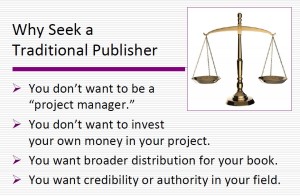 You’ve produced a blogged book manuscript. Now what? You can choose two ways to publish your book: with a traditional publisher or independently as a self-publisher. Why might you opt for traditional publishing? Here are four good reasons to traditionally publish your book.
You’ve produced a blogged book manuscript. Now what? You can choose two ways to publish your book: with a traditional publisher or independently as a self-publisher. Why might you opt for traditional publishing? Here are four good reasons to traditionally publish your book.
1. You don’t want to be a “project manager.”
If you don’t like handling details or managing people, traditional publishing might be the right publishing route for you. Self-publishing a book, allows you to control your book project from start to finish, but this means hiring a variety of subcontractors, such as editors, proofreaders, indexers, designers, printers, and distributors. If you are willing to give up control of things like cover design and book title to also give up control of your project, you will enjoy traditional publishing. Your editor at the publishing house becomes the project manager. He or she will contact you with the details you need to handle, and the major decisions will be made by the editorial, marketing and design teams. You might be asked your opinion, but they have the last say. They will make sure deadlines get met. You just do your part—write your book on deadline.
2. You don’t want to invest you own money in your project.
If finances hold you back from publishing your book, traditional publishing can provide a good option. Traditional publishers serve as venture capital partners for aspiring authors. Basically, you approach them with a business proposition—a product you want to launch into the market (your book)—and they determine if it is viable and want to invest in it and in you. If they feel the book is marketable and that you make a good business partner, they decide to back your project. That means you receive a contract for the purchase of your manuscript and an advance on sales of the book. The latter is an estimate of the amount of money the publisher thinks the book might earn on copies sold. When the book earns back that amount of money after release, you begin earning royalties, which are based on a percentage of ongoing book sales. You may be asked to pay for indexing, but this can be negotiated. Sometimes there are permissions or other expenses that need to be negotiated as well. These days there are forms of hybrid publishing that involve the author and publisher sharing costs, but research these companies carefully to be sure they aren’t thinly-disguised vanity publishing deals.
3. You want broader distribution for your book.
Traditional publishing is more likely to get your book into a brick-and-mortar bookstore, although not all traditionally published books end up on bookstore shelves. Self-published books rarely get into anything other than online bookstores unless you get to know your local bookshop owner. If you go the indie route you can work with a distributor, but it tends to end up costing more than it is worth. So, if you want broader distribution for your book, traditional publishing is your best option.
4. You want credibility or authority in your field.
Although self-published authors have gained more credibility, traditional published authors still receive more clout. Thus, if you want authority in your field—especially as a nonfiction author, having a traditional publisher’s name on your book helps. When people realize a publisher has put money behind your book, they believe that means you’ve been vetted out. If credibility and authority are important to you, seek a traditional publisher.
As you can see, choosing a traditional publisher has a lot to do with your personality, your situation and the type of book you want to publish. Take all these things into consideration as you determine how to publish your book.

Nina, thank you for these four good reasons for seeking traditional publishers. The more I read what authors, bloggers, agents and editors associated with publishing houses write, the more convinced I am that the traditional publishing route makes sense for my project.